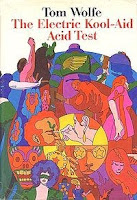The question was inspired by Technollama's
indignant response to some gadget freakery about the iPad killing the humble book and how George Orwell would have written 'apps' if he were alive today.
"Book" is an increasingly elastic concept. We have hardbacks, paperbacks, e-books, talking books, and so on. So a
dictionary definition such as "A set of written, printed, or blank pages fastened along one side and encased between protective covers" is way too narrow.
A book is of course more than a physical item. No definition should ignore the content and the diverse forms in which that content may be consumed. In this sense, the definition of "book" should be no different than that of a '
television'.
Top of head, it might be more apt to define "book" as, say, "a coherent collection of thoughts recorded in text and graphical form by the creator(s), and edited, packaged and published by an independent person." That would allow you to distinguish, say, an academic paper, which I don't believe is (or should be!) edited by a person independent of the creator. Maybe that's wrong - I'm no academic.
Interestingly, 'film' and 'television show' are increasingly harder to differentiate from 'book' in these terms.
I agree with Technollama that it's lazy, ridiculous and futile to speculate whether Orwell would have forsaken books for 'apps' the second he clapped eyes on an iPad. He's dead. At any rate, the lack of reference to a living author in this vein is telling.
Of course there must be successful living authors who've previously only found expression in "pages fastened along one side and encased between protective covers" who are discovering a new dimension to their musings via the latest technology.
Cory Doctorow is one example, although he seems to use technology for publishing, marketing and distributing his books in 'traditional' form rather than the act of creation itself. But I have trouble believing Mr Doctorow will cease producing "books" because of the iPad. I'd ask him, but the proof will be whether he does or not - as an old English teacher used to say, "never trust the author, trust the tale" ;-)
When it comes to new technology, it's more interesting - indeed fascinating - to consider how the expression of the same thoughts varies according to the medium. In other words, how each new medium alters expression.
Copywriters, screenwriters and playwrights experience this for a living, of course.
Dean Johns could explain that dynamic far better than me. But anyone with broadband and a bit of self-confidence can use, say,
Xtranormal to turn a blog post into an animated clip and experience the edits required to convert perfectly idiomatic written words into idiomatic speech. It's perhaps tougher to distil a written paper into a compelling visual presentation (i.e. one that doesn't involve reading the paper and clicking slides).
Saul Klein seems good at this, and the presentations at
GikII (exploring the legal interaction between popular culture, speculative fiction, and new technology) are a sight to behold. Neither process is equal to the challenge of turning a novel into a feature film. Some scenes or concepts in the text are simply not practicable, convincing or satisfying in a visual medium - even with all the resources of Hollywood theoretically at one's disposal. But each process reveals that an original work provides only rough guidance as to how its meaning should be conveyed in a new medium. For that reason, the expression of a thought in one medium is no substitute for the expression of that thought in another. And it should follow that no medium is a substitute for another, or will "kill" it.
The replacement of vinyl records and casette tapes with CDs is really the evolution of one type of medium, rather than a whole new medium replacing others.
So what difference, if any, will the iPad make (even if one could glorify it as a medium in itself)?
That remains to be scene (I couldn't resist). However, the potential for added distribution alone, if not new modes of expression altogether, makes it worthwhile for 'traditional' authors to follow such steps in the evolution of technology and how people - their customers - react.
Living authors, that is. George Orwell can rest in peace.
.jpg)

.jpg)








%5B1%5D.jpg)











